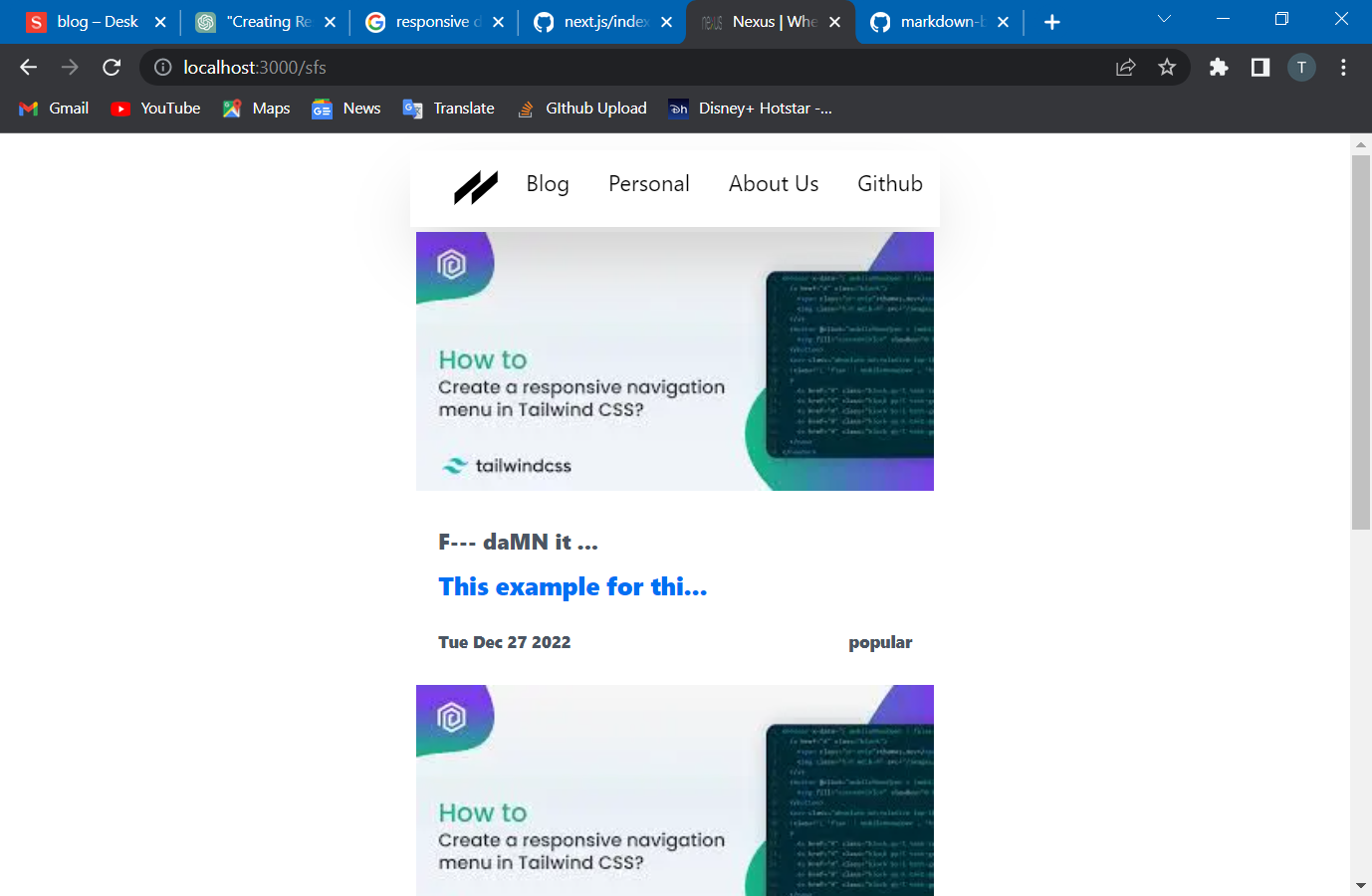
Creating Responsive Components with Tailwind CSS: A Step-by-Step Guide
Learn how to create responsive components using the popular utility-first CSS framework, Tailwind CSS. This step-by-step guide will walk you through the process of designing and building flexible, mobile-friendly components for your website or application

Blog post By Prithviraj - Published at 12/27/2022, 11:16:15 AM
Setting Tailwind for nextjs
So for this tutorial, we will use nextjs as our front end. Setting up with react is very similar, but as nextjs is becoming a popular framework so it's good to learn it.
Template for Tailwindcss and Nextjs
yarn create next-app --example with-tailwindcss with-tailwindcss-app
this will generate the boilerplate code for us.
now in file `index.tsx` clear all default things like this:
import type { NextPage } from 'next'
import Head from 'next/head'
const Index: NextPage = () => {
return (
<div className="flex min-h-screen flex-col items-center justify-center py-2">
<Head>
<title>Create Next App</title>
<link rel="icon" href="/favicon.ico" />
</Head>
<main className="">
{/* Our Code goes here */}
</main>
</div>
)
}
export default Indexhere the Header component goes in `components` directory ;
import Link from "next/link";
export default function Header() {
return (
<div className="flex min-h-screen flex-col items-center justify-center py-2">
<main className="">
<div className="sm:sticky sm:top-0 sm:z-50 font-sans flex m-1 p-3 justify-center sm:justify-center lg:justify-end shadow-2xl flex-wrap">
<div className=" hidden sm:flex justify-start flex-grow mx-5 items-center">
<a href="/">
<svg
xmlns="http://www.w3.org/2000/svg"
className="h-8 w-8 text-blue-400 "
xmlnsXlink="http://www.w3.org/1999/xlink"
viewBox="344.564 330.278 111.737 91.218"
width="53.87"
height="43.61"
>
<defs>
<linearGradient
id="logo_svg__b"
gradientUnits="userSpaceOnUse"
x1="420.97"
y1="331.28"
x2="420.97"
y2="418.5"
>
<stop offset="0%"></stop>
<stop offset="100%"></stop>
</linearGradient>
<linearGradient
id="logo_svg__d"
gradientUnits="userSpaceOnUse"
x1="377.89"
y1="331.28"
x2="377.89"
y2="418.5"
>
<stop offset="0%"></stop>
<stop offset="100%"></stop>
</linearGradient>
<path
d="M453.3 331.28v28.57l-64.66 58.65v-30.08l64.66-57.14Z"
id="logo_svg__a"
></path>
<path
d="M410.23 331.28v28.57l-64.67 58.65v-30.08l64.67-57.14Z"
id="logo_svg__c"
></path>
</defs>
<use xlinkHref="#logo_svg__a" fill="url(#logo_svg__b)"></use>
<use xlinkHref="#logo_svg__c" fill="url(#logo_svg__d)"></use>
</svg>
</a>
</div>
<ul className="flex space-x-7 flex-row ">
<Link
href="/posts/**"
className="hover:text-blue-300 transition-transform hover:translate-y-1 hover:translate-x-1"
>
<>Blog</>
</Link>
<Link
href="personal website"
target="_blank"
className="hover:text-blue-300 transition-transform hover:translate-y-1 hover:translate-x-1"
>
<>Personal</>
</Link>
<Link
href="/about"
className="hover:text-blue-300 transition-transform hover:translate-y-1 hover:translate-x-1"
>
<>About Us</>
</Link>
<Link
href="my github"
target="_blank"
className="hover:text-blue-300 transition-transform hover:translate-y-1 hover:translate-x-1"
>
<>Github</>
</Link>
</ul>
</div>
{/* Our Code goes here */}
</main>
</div>
);
}
the changed file:
import type { NextPage } from 'next'
import Head from 'next/head'
import Header from "../components/header";
const Index: NextPage = () => {
return (
<div className="flex min-h-screen flex-col items-center justify-center py-2">
<Head>
<title>Create Next App</title>
<link rel="icon" href="/favicon.ico" />
</Head>
<main className="">
<Header/>
</main>
</div>
)
}
export default Indexand then another one for displaying blog articles:
import Link from "next/link";
import Image from "next/image";
export default function DestinationCard(destination: any) {
return (
<article className="flex flex-col dark:bg-gray-900">
<Link
href={`/posts/${destination.slug}`}
className="text-[#0070f3] hover:text-[#729ff9] font-semibold text-base"
>
<div className=" flex justify-center items-center">
<Image
className="aspect-sqar"
width={400}
height={300}
sizes="100vw"
alt={String(destination.title)}
src={destination.mainImage}
/>
</div>
<div className="flex flex-col flex-1 p-6">
<p className="text-gray-600">
{destination.description}{" "}
</p>
<h3 className="flex-1 py-2 text-lg font-semibold leading-snug">
{destination.title}
</h3>
<div className="flex flex-wrap justify-between pt-3 space-x-2 text-xs dark:text-gray-400">
<p className="text-gray-600">
{" "}
{new Date(destination._createdAt).toDateString()}{" "}
</p>
<p className="text-gray-600">popular</p>
</div>
</div>
</Link>
</article>
);
}
We will use `next/image` or the Image component for Image Optimization and SEO.
and now the index:
import Link from "next/link";
import DestinationCard from "../components/post";
const data = {
_createdAt: new Date(),
publishedAt: new Date(),
_id: "184yfnqywqfhqryhfhoa",
slug: {
current: "my-fist-blog",
},
mainImage:
"https://cdn.sanity.io/images/kgu0y8sn/production/32b4e87a7dc764a8901f1513e1553c7e3a7e33f2-318x159.png",
description: "F--- daMN it ",
author: {
name: "Xyz",
image:
"https://cdn.sanity.io/images/kgu0y8sn/production/32b4e87a7dc764a8901f1513e1553c7e3a7e33f2-318x159.png",
},
title: "This example for this tutorial",
};
export default async function Page() {
return (
<div className="flex min-h-screen flex-col items-center justify-center py-2">
<main className="">
<div className="sm:sticky sm:top-0 sm:z-50 font-sans flex m-1 p-3 justify-center sm:justify-center lg:justify-end shadow-2xl flex-wrap">
<div className=" hidden sm:flex justify-start flex-grow mx-5 items-center">
<a href="/">
<svg
xmlns="http://www.w3.org/2000/svg"
className="h-8 w-8 text-blue-400 "
xmlnsXlink="http://www.w3.org/1999/xlink"
viewBox="344.564 330.278 111.737 91.218"
width="53.87"
height="43.61"
>
<defs>
<linearGradient
id="logo_svg__b"
gradientUnits="userSpaceOnUse"
x1="420.97"
y1="331.28"
x2="420.97"
y2="418.5"
>
<stop offset="0%"></stop>
<stop offset="100%"></stop>
</linearGradient>
<linearGradient
id="logo_svg__d"
gradientUnits="userSpaceOnUse"
x1="377.89"
y1="331.28"
x2="377.89"
y2="418.5"
>
<stop offset="0%"></stop>
<stop offset="100%"></stop>
</linearGradient>
<path
d="M453.3 331.28v28.57l-64.66 58.65v-30.08l64.66-57.14Z"
id="logo_svg__a"
></path>
<path
d="M410.23 331.28v28.57l-64.67 58.65v-30.08l64.67-57.14Z"
id="logo_svg__c"
></path>
</defs>
<use xlinkHref="#logo_svg__a" fill="url(#logo_svg__b)"></use>
<use xlinkHref="#logo_svg__c" fill="url(#logo_svg__d)"></use>
</svg>
</a>
</div>
<ul className="flex space-x-7 flex-row ">
<Link
href="/posts/**"
className="hover:text-blue-300 transition-transform hover:translate-y-1 hover:translate-x-1"
>
<>Blog</>
</Link>
<Link
href="personal website"
target="_blank"
className="hover:text-blue-300 transition-transform hover:translate-y-1 hover:translate-x-1"
>
<>Personal</>
</Link>
<Link
href="/about"
className="hover:text-blue-300 transition-transform hover:translate-y-1 hover:translate-x-1"
>
<>About Us</>
</Link>
<Link
href="my github"
target="_blank"
className="hover:text-blue-300 transition-transform hover:translate-y-1 hover:translate-x-1"
>
<>Github</>
</Link>
</ul>
</div>
<DestinationCard {...data} />
<DestinationCard {...data} />
<DestinationCard {...data} />
{/* Our Code goes here */}
</main>
</div>
);
}
/* eslint-disable @next/next/no-img-element */
So yeah we are done with the responsive components. Let's see a demo of it

Hope you guys enjoyed the session.